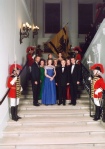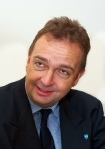


A L L R I G H T S R E S E R V E D © 2 0 1 4 C A N A D A E X C L U S I V E
D e s i g n R A Y P H O T O s t u d i o, C r e a t e d b y WEB -
CANADA Exclusive
Mariánska 12
811 08 Bratislava
Slovak Republic
Tel.: +421 252 932
895
Fax: +421 252 932 896
Cell: +421 911 424 435
[email protected]
s p e c i a l
Karl von Habsburg-
Successor to the Imperial Dynasty
What are your current relations with SR?
First of all, there are strong historical relations linked to my family. The whole
process of accession to the European Union was very important to me as well. Although,
I was not in the delegation I was very much engaged and interested in the process.
Also, I frequently interact with the Slovakian military regarding the questions in
culture heritage protection. Overall, there are many connections, which I think
are very positive and very good.
During the Second World War, the former empress, Zita Habsburg lived in Quebec, together
with the younger children. What is your relationship with Canada?
Again, I would like to mention very important historical relationship. My family
was able to find a refuge in Canada for quite some time during the World War II.
It was a very complicated and difficult period. In this aspect Canada is traditionally
playing a very important role for many people, not only for my family. Of course,
one feels very strongly when somebody helps you in such a difficult situation.
You are a Vice-
The Main goal always have to be to talk about bigger Europe, because it was always
“small Europe” that was under discussion. At some stage, Western Europe was the broadly
debated topic. These days, it is the Schengen group, Europe group, etc. Europe is
in process of growing and that needs to be emphasised. The expression “paneuropean”,
by itself, symbolizes a holistic view to perceive Europe as a bigger entity. Nevertheless,
we as Pan-
10 years ago, you were the General Manager of Unrepresented Nations and Peoples Organization. What specific problems have the UNPO focused recently?
UNPO is an organisation that represents ethnic minorities, mainly those, that do
not have ability to represent themselves. Certain large ethnic groups are not represented
in UNPO, because they created big structures where they can represent themselves.
The focus of UNPO, for numerous reasons, was always to work for small ethnic groups.
A lot of members of these minorities are oppressed in a difficult situation and it
is crucial to look after them and make sure that their identity is protected. By
protecting their identity we are essentially protecting our own culture. Another
goal of UNPO is to apply the right to self-
You are the president of the Association of the National Committees of the Blue Shield. Could you provide some details of their activities, please?
It is an organization that has its roots in international law. It was created through
the Hague convection in 1954, because during the World War II., people started to
be aware that conflict goes hand in hand with destructions of cultural heritage.
The organization was created, however did not find practical use at that time. One
of the specific reasons why that happened was that there were no legal grounds to
take any serious action. It took more legal steps to give the organisation, such
as Blue Shield, the “teeth” to able to be really active. One of the important things
was adding of the so-
On January 1, 2007 you took over as the Head of the House of Habsburg, a function
that was formerly represented by your father Otto, what is the practical impact of
that event?
I had a chance and huge privilege to have been working together with my father for many years before that. The Head of the House of Habsburg sounds very grand, but a lot of it is administrative work, such as allocating the family, finding members of the family and deciding where is it necessary to represent it.
You are the Head and Sovereign of the Order of the Golden Fleece. What does it mean
and how many members are there?
The Order of a Golden Fleece has always been restricted and limited to 50 members. At its foundation it is a very eminent political order. It was founded by Phillip the Good who, politically, found himself in a very difficult situation at a time of its creation. As a duke of Burgundy, geographically, he was trapped between two huge and powerful structures, which were King of France on one side, and the Roman King on the other side. The objective was to create a political institution that connects these neighbours with whom he potentially could have conflict and to give the order the sovereign rights, such as declaring war and peace. The idea was to create an institution that puts all the different sides together and in case of conflict they are forced to sit it out behind table to avoid military actions. In this sense, this order was created to overcome conflict and is very similar to some of the institutions that exist today. For example, even the primary impulse for creation of the European Union rises from the conflict between France and Germany. The order of the Golden Fleece is a political instrument that comprised many of the big families at that time as well as today. It does not have the authority to decide over war and peace anymore, but it gives the knights of the order the possibilities to exchange the ideas on a regular basis. It is not a charitable order, but much more a political institution.
President of the Canadian Chamber of Commerce is much sympathizing with your negative attitude towards the medicament Mifegyne, used for termination of pregnancy. Please provide some details on your attitude.
As a Catholic I am standing for a functioning family. Family should provide a safe
heaven for their members in a way that abortion is not needed. The family is the
smallest nucleus and the basis of our society. That is the reason, why I am engaging
myself in these sorts of topics when the situation offers itself. For me, it is a
much more a political decision that I would like to see enacted to support family
as a safe structure in society.
You are an owner of Porsche 911. What is your attitude towards sport automobiles?
For me a car is a means to work effectively. I am doing most of my travels on my
own and that is why I choose comfortable, safe and fast car. And that is exactly
what this car is providing me with. My son is a passionate race car driver who is
now racing in formula Masters for Lotus, so I am linked to this community though
him.
Do you have any hobbies?
I do not have a classical hobby. My work is so interesting and diversified that I do not feel the need to have a hobby of that sort. In my work I can represent those things for which I really have passion. In general, my work is very diversified and has a lot of interesting elements and overall the work that I am doing is giving me a feeling that I do not need a hobby.
Your sons name is Ferdinand Zvonimir, what inspired you to use Slavic name Zvonimir?
First of all, our family is very closely linked to a Slavic part of Europe. But the
real reason is that I met my wife in Croatia. It was during the time of conflict
and we worked to protect Croatian cultural heritage, which was for us both a way
of saving the European identity. In order to honour that fact, we decided that all
our children should have a Croatian second name.
You are living in the Anif, small town near Salzburg in the former Villa Swoboda, now Casa Austria. What is the history of the dwelling in context with your title of Archduke of Austria?
The dwelling has nothing to do with my title. We bought the house, because we wanted
to live in Salzburg. A Viennese construction company that belonged to Mr. Swoboda
built the house in 1850s. Mr. Swoboda built the house for himself and later it was
used on a several occasions for meetings between the German and Austrian emperor
and partly also for the honeymoon of Crown Prince Rudolf. The family had some relationship
with the house only because it is located in a convenient place close to Salzburg.
Your younger brother Georg is living in Budapest with his family. Why did he choose Budapest rather Germany or Austria?
While he was studying, and even earlier, during the time before the iron curtain
fell down, there was a necessity and a possibility for a member of our family to
engage himself in Hungary. I am very grateful to him that he grabbed this opportunity
and moved to Hungary and basically have the family represented there as well. It
was his personal decision, strongly supported by his father and also by me. I think
he established himself very well there.
Lucia Kyrinovičová
Photo by George Velebír and archive of Karl von Habsburg









